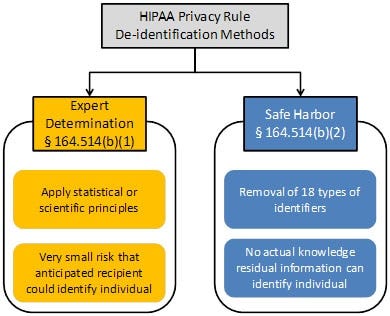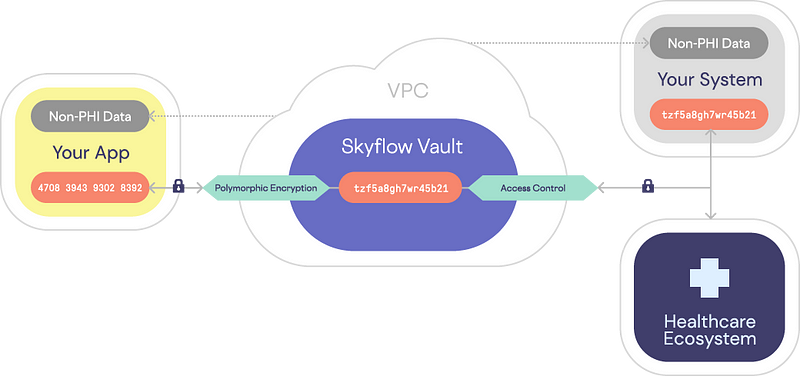# Enhancing Data Privacy in Healthtech: Why a Data Vault is Essential
Written on
Chapter 1: The Importance of Data Privacy in Healthtech
In an era where healthcare apps and wearable devices are becoming ubiquitous, the significance of safeguarding data privacy for healthtech companies has reached new heights. Healthtech broadly encompasses any technological advancements that aid in healthcare, including not just traditional medical applications but also fitness trackers, nutrition apps, and biometric devices. As a result, the entities behind these innovations frequently handle protected health information (PHI).
While healthtech companies provide substantial benefits to consumers, they also face considerable risks. Compliance with the Health Insurance Portability and Accountability Act (HIPAA) is crucial, as it outlines the guidelines for how organizations must manage and protect PHI. Non-compliance can lead to severe repercussions, such as fines, lawsuits, or even closure of the business. However, merely adhering to HIPAA is often insufficient for providing comprehensive privacy protection.
In this discussion, we will examine how your healthtech company can enhance privacy measures by integrating a data privacy vault within your applications. Additionally, we will highlight the advantages of exceeding minimum legal requirements for PHI protection, which can enhance customer loyalty and improve your healthtech offerings.
Understanding HIPAA Compliance and PHI
HIPAA serves as the foundational compliance framework for safeguarding patient health data in the United States. This legislation establishes the minimum requirements that healthtech firms must meet to protect PHI.
The Uniqueness of PHI
Unlike financial data, which can fluctuate, or personally identifiable information (PII), which can change over time, PHI is distinctive because it typically remains constant. For instance, laboratory results and medical histories are fixed data points, necessitating stringent protections under HIPAA.
Definition of PHI
HIPAA delineates what constitutes PHI, including any information that can identify an individual and relates to their health status, healthcare services provided, or payment for such services. This means that any health-related information tied to identifiable details—such as names or ID numbers—must be secured.
HIPAA regulations apply to what the U.S. Department of Health and Human Services (HHS) refers to as "Covered Entities and Business Associates," encompassing any health-related applications that manage PHI. Operating without HIPAA compliance can result in hefty penalties, customer remediation costs, and inclusion in the notorious HIPAA Wall of Shame.
Why HIPAA Compliance Matters
From a compliance perspective, the importance of HIPAA for healthtech companies cannot be overstated.
How a Data Privacy Vault Safeguards PHI
Fortunately, there are effective methods for protecting customers' PHI. The HHS has provided guidance on how to de-identify PHI, allowing organizations to remove identifiers from health data so it can no longer link back to individuals.

However, healthtech companies must ensure that they implement these methods correctly. Attempting a DIY approach could divert valuable resources from core business functions and create uncertainties about data security.
To address this, many healthtech firms are adopting the data privacy vault architectural model. A purpose-built data privacy vault enables secure storage of customer identifiers in an isolated, encrypted environment, separate from regular transactional data. This approach facilitates the de-identification of health data, thus protecting both customers and the organization. Features like tokenization, masking, and redaction provided by a data privacy vault significantly reduce the risks associated with handling protected data.
Now that we understand the risks of non-compliance and the advantages of a data privacy vault, the pressing question arises: Is the investment worthwhile? Would it be prudent to rely on existing protections and assume some level of risk?
Reducing the Risk of Data Breaches
If your company is already operational without a data privacy vault, you might feel reluctant to invest further in what seems like a neutral gain. However, it’s vital to recognize that even a minor breach affecting as few as 500 customers can land you on the HIPAA Wall of Shame.
Moreover, the best way to repay your customers for their trust is by creating a more secure system.

While you may believe that you've met HIPAA’s de-identification standards, implementing a data privacy vault can further minimize breach risks and foster greater trust among your clientele. The architecture illustrated above shows that only tokenized, masked, or redacted data would circulate within your systems, enabling you to surpass HIPAA requirements and avoid scrutiny.
Building Customer Trust Through Privacy
Establishing a privacy-focused system does more than just mitigate risks; it can also serve as a compelling incentive for attracting customers. By effectively protecting customer data, you can leverage it for various workflows and extract valuable insights without compromising identifiable information.
Selecting an appropriate tool for managing PHI will also necessitate the development of data governance policies and access controls. By clearly defining these operational aspects, you can ensure that your customers’ trust is well-placed.
Given the increasing demand for privacy in consumer technology—particularly in healthtech—prioritizing these policies will distinguish your company as a leader in data protection, setting you apart from competitors.
Conclusion
For those interested in further understanding HIPAA compliance or how a data privacy vault can enhance other aspects of HIPAA, a wealth of resources is available. With the myriad of effective tools currently on the market, establishing a secure solution for your healthtech organization is not only feasible but also readily accessible. Protecting your customers from compromised PHI is a significant responsibility, so ensure that you utilize the right tools to secure their health data.
The first video provides insights on navigating privacy in the digital health landscape, discussing the importance of safeguarding sensitive data in healthtech environments.
The second video explores strategies for ensuring data security in healthcare for 2023, focusing on best practices for protecting patient information.